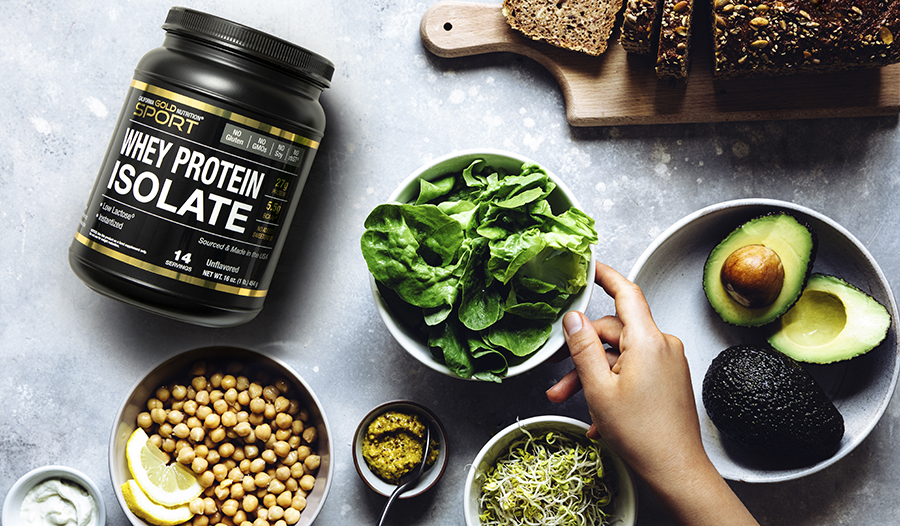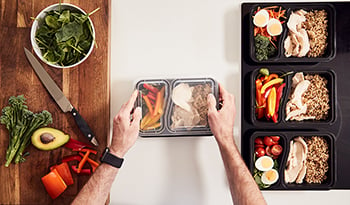Intermittent Fasting: What You Can Eat and Drink

What Is Intermittent Fasting?
Intermittent fasting (IF) is an eating pattern where you cycle between periods of eating and fasting (not eating). Optimal intermittent fasting also includes healthy foods that should be consumed but it’s just as important to consider when to consume them.
Of all the buzz-worthy diet options such as the Keto Diet, the Dukan Diet, or the Paleo Diet, intermittent fasting (IF) is currently one of the world’s most popular health trends and one that has garnered much attention—for good reason. Throughout history, fasting has been part of many people’s lives whether for personal, spiritual, or religious reasons or simply because they did not have access to food.
Scientific evidence shows just how powerful intermittent fasting is to our health, weight, metabolic health, and aging. A multitude of benefits may be had from fasting, including increased insulin sensitivity, fat loss including belly fat, improved cholesterol profiles, increased growth hormone (HGH) production, and improved gut health.
Types of Intermittent Fasting
- The 12:12 Method: Fasting for 12 hours each day by only eating between 7 am and 7 pm.
- The 16:8 Method: Fast for 16 hours each day by only eating between noon and 8 pm.
- Eat-Stop-Eat: Once or twice a week, don’t eat anything from dinner one day, until dinner the next day (a 24 hour fast).
- The 5:2 Diet: During 2 days of the week, eating only about 500–600 calories.
Because a portion of your day will be spent fasting, it's important to think strategically about ways to incorporate adequate nutrition. Eating a diet that is high in refined carbohydrates such as flour and sugar, refined oils such as soy or vegetable oils, too little intake of protein, a lack of veggies, and unhealthy snacks such as chips will only undo the health benefits you gain from fasting. Eating the wrong foods will counter the benefits of intermittent fasting.
What Should I Eat While Intermittent Fasting?
So now you know when to eat, you may be wondering what you can eat during your intermittent fasting eating window. Many of the intermittent fasting methods mean you may be inadvertently missing out on specific macronutrients such as protein or healthy fats, or micronutrients such as vitamin A, B vitamins, vitamin C, vitamin D, zinc, or electrolytes.
It is important to ensure you are eating a full and satisfying meal—now is not the time to engage in low-calorie eating. The goal is to get all of your nutrition from fewer meals.
Here are the top foods to eat while fasting.
Protein
Protein is vital to your overall health, immune health, and to ensure you maintain muscle mass. Muscle is necessary to optimize blood sugar balance and keep our metabolism high. Lack of muscle can promote weight gain, higher blood sugar, and frailty.
Remember to include cultured protein foods such as plain yogurt, kefir, buttermilk, or cottage cheese in your intermittent fasting diet as these foods are rich in probiotics to support a healthy gut microbiome.
Optimal protein sources include:
- Salmon
- Eggs
- Ribeye steak
- Pork chops
- Chicken thighs
- Cottage cheese
- Plain yogurt
- Plain kefir
- Whey protein powder (without added sugar)
- Pea protein powder (without added sugar)
- Legumes
- Nuts and seeds
While fasting, it can be challenging to have an adequate intake of protein. Adding protein powder during your eating window can be of great benefit by adding in specific amino acids such as L-glutamine or branched-chain amino acids (BCAAs).
Healthy Fats
Healthy fat is crucial to optimal health. However, many people have a fear of fat, but they shouldn’t. Healthy fat is necessary for cellular health, energy, hormone production, insulation to keep us warm, and protection for our organs. Adding fat to the diet is required to metabolize fat-soluble nutrients such vitamin D, vitamin E, multivitamins, or even herbs and spices such as turmeric or rosemary. These vitamins need fat and do not dissolve with water.
Sources of healthy fats include:
- Olive oil
- Avocado oil
- Coconut oil
- MCT oil
- Ghee
- Avocados
- Nuts and nut butter
- Chia seeds
- Flaxseeds
- Olives
Fish and Seafood
Seafood of any type is an excellent choice during your intermittent fasting feeding window. Fish such as wild-caught salmon or sardines are very high not only in protein but also rich in omega-3 fats that are necessary for optimal health and to reduce cellular inflammation. DHA and EPA are considered essential fats—omega-3 fats that we must get from our diet. Unfortunately, with intermittent fasting, many are deficient in this necessary nutrient, and why supplementation would be an excellent choice in this case.
Fish and seafood to optimize intermittent fasting include:
- Wild-caught salmon
- Rainbow trout
- Mackerel
- Sardines
- Anchovies
- Mussels
- Oysters
- Crab
- Lobster
- Shrimp
Veggies
Vegetables are vital to optimal health and adding them to your diet while IF is an excellent strategy. Vegetables also serve as prebiotics—the vegetable fibers feed our healthy gut bugs that result in a healthier gut, a leaner body, and optimal health.
Nutrient-rich vegetables to eat while intermittent fasting:
- Spinach
- Chard
- Arugula
- Kale
- Broccoli
- Cauliflower
- Brussel sprouts
- Cabbage
- Celery
- Asparagus
- Seaweed
Fruits
Fruit can be a welcome source of nutrient-rich food while one is intermittent fasting. However, choosing low or medium-sugar fruits is important as an excess amount of fruit sugar (fructose) can promote metabolic health issues and undo many of the benefits accrued while IF.
Best fruits to choose for intermittent fasting include:
- Strawberries
- Raspberries
- Blackberries
- Kiwi
- Grapefruit
- Apples
- Lemons
- Limes
- Avocado
- Tomato
Whole Grains
Whole grains are a unique type of food in that for many people, they either have no increased blood sugar response, inflammation, or gut distress, but for others, they have all of the aforementioned maladies. If you are one of those who cannot tolerate grains via the lectin or gluten inherent in the grains, leave them off your shopping list. Remember to avoid all refined foods, including grains such as white flour.
Healthy whole grains that help to optimize intermittent fasting include:
- Organic oatmeal
- Organic millet
- Organic quinoa
- Organic brown rice
- Organic black rice
- Organic wild rice (Actually a seed)
Legumes And Beans
Beans and legumes are excellent choices for your intermittent strategy meal planning. They are often disregarded but are true powerhouses packed with fiber, antioxidants, protein, B vitamins, and other vitamins and minerals. They help to balance blood sugar, keep hunger and cravings at bay (perfect for intermittent fasting), reduce LDL cholesterol, and promote gut health, the epicenter to every aspect of health.
Nutrient-rich beans and legumes include:
- Black Beans
- Chickpeas (garbanzo beans)
- Green beans
- Lentils
- Lima beans
- Kidney beans
Herbs And Spices
Herbs and spices have a potent, powerful, and anti-inflammatory impact upon our health, and are delicious too. They help to optimize your intermittent fasting results. Add any herb and spice to almost every meal.
Top herbs and spices include:
Beverages
Intermittent fasting means you cannot eat during your fasting period. A good rule to remember is that anything with calories will break a fast such as soda, juice, and coffee or tea with any type of milk, creamer, or sweetener.
However, while intermittent fasting you can have water and coffee or tea without sweetener, milk, or creamer. In fact, coffee and tea (green tea in particular) help boost the benefits of intermittent fasting.
Top drinks to optimize intermittent fasting include:
Takeaway
Intermittent fasting is a way of eating that is simple and safe and based on robust evidence. Going without food may seem daunting at first glance, however, when you begin to do it, it is truly a powerful and easy way to optimize overall health, weight, brain health, and gut health. It is important to note that fasting can affect the way your body absorbs certain vitamins and medications, so you’ll want to take them with food.
If the ancient Romans used intermittent fasting to stay super fit, strong, and healthy, why shouldn’t we?
References:
- Li Z, Huang L, Luo Y, Yu B, Tian G. Effects and possible mechanisms of intermittent fasting on health and disease: a narrative review. Nutr Rev. 2023 Nov 10;81(12):1626-1635.
- Ma Y, Sun L, Mu Z. Network meta-analysis of three different forms of intermittent energy restrictions for overweight or obese adults. Int J Obes (Lond). 2024 Jan;48(1):55-64.
- Guo M, Wang X, Li Y, Luo A, Zhao Y, Luo X, Li S. Intermittent Fasting on Neurologic Diseases: Potential Role of Gut Microbiota. Nutrients. 2023 Nov 24;15(23):4915.
- Naous E, Achkar A, Mitri J. Intermittent Fasting and Its Effects on Weight, Glycemia, Lipids, and Blood Pressure: A Narrative Review. Nutrients. 2023 Aug 21;15(16):3661.
- Salehi N, Walters M. When and what to eat? A scoping review of health outcomes of fasting in conjunction with a low-carbohydrate diet. Br J Nutr. 2023 May 28;129(10):1677-1692.
- Kavyani Z, Musazadeh V, Fathi S, et al. Efficacy of the omega-3 fatty acids supplementation on inflammatory biomarkers: An umbrella meta-analysis. Int Immunopharmacol. 2022 Oct;111:109104.
- Diffenderfer MR, Rajapakse N, Pham E, et al. Plasma fatty acid profiles: Relationships with sex, age, and state-reported heart disease mortality rates in the United States. J Clin Lipidol. 2022 Mar-Apr;16(2):184-197.
DISCLAIMER:This Wellness Hub does not intend to provide diagnosis...
















































































 Table of Contents
Table of Contents
















